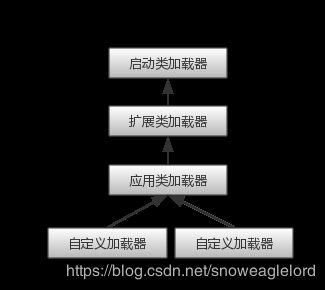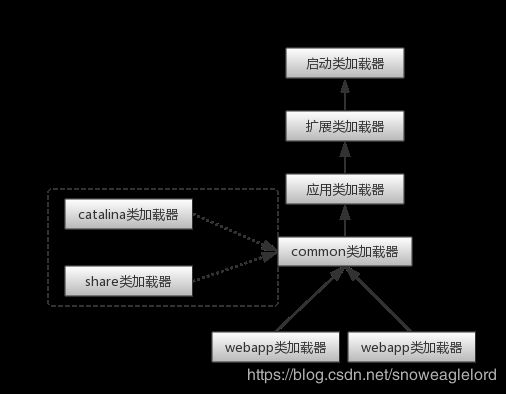- 简单了解 JVM
记得开心一点啊
jvm
目录♫什么是JVM♫JVM的运行流程♫JVM运行时数据区♪虚拟机栈♪本地方法栈♪堆♪程序计数器♪方法区/元数据区♫类加载的过程♫双亲委派模型♫垃圾回收机制♫什么是JVMJVM是JavaVirtualMachine的简称,意为Java虚拟机。虚拟机是指通过软件模拟的具有完整硬件功能的、运行在一个完全隔离的环境中的完整计算机系统(如:JVM、VMwave、VirtualBox)。JVM和其他两个虚拟机
- JVM、JRE和 JDK:理解Java开发的三大核心组件
Y雨何时停T
Javajava
Java是一门跨平台的编程语言,它的成功离不开背后强大的运行环境与开发工具的支持。在Java的生态中,JVM(Java虚拟机)、JRE(Java运行时环境)和JDK(Java开发工具包)是三个至关重要的核心组件。本文将探讨JVM、JDK和JRE的区别,帮助你更好地理解Java的运行机制。1.JVM:Java虚拟机(JavaVirtualMachine)什么是JVM?JVM,即Java虚拟机,是Ja
- 深入浅出 -- 系统架构之负载均衡Nginx的性能优化
xiaoli8748_软件开发
系统架构系统架构负载均衡nginx
一、Nginx性能优化到这里文章的篇幅较长了,最后再来聊一下关于Nginx的性能优化,主要就简单说说收益最高的几个优化项,在这块就不再展开叙述了,毕竟影响性能都有多方面原因导致的,比如网络、服务器硬件、操作系统、后端服务、程序自身、数据库服务等,对于性能调优比较感兴趣的可以参考之前《JVM性能调优》中的调优思想。优化一:打开长连接配置通常Nginx作为代理服务,负责分发客户端的请求,那么建议开启H
- 常见的 JVM 调优方法有哪些?
爪哇天下
jvm
常见的JVM调优方法有哪些?可以具体到调整哪个参数,调成什么值?对年轻代的EdenSurvivor的比例进行配置-XX:SurvivorRatio=8:表示设置2个Survivor区:1个Eden区的大小比值为2:8,这意味着Survivor区占整个年轻代的1/5,这个参数默认为8如果经常性的SurvivorTo放不下YGC的剩余的对象时候,可以适当的调整比例常用的CMS收集器:设置回收阈值,需要
- JVM源码分析之堆外内存完全解读
HeapDump性能社区
概述广义的堆外内存说到堆外内存,那大家肯定想到堆内内存,这也是我们大家接触最多的,我们在jvm参数里通常设置-Xmx来指定我们的堆的最大值,不过这还不是我们理解的Java堆,-Xmx的值是新生代和老生代的和的最大值,我们在jvm参数里通常还会加一个参数-XX:MaxPermSize来指定持久代的最大值,那么我们认识的Java堆的最大值其实是-Xmx和-XX:MaxPermSize的总和,在分代算法
- 程序计数器的作用
毕加涛
java
程序计数器的作用就是**用来记住下一条jvm指令的执行地址。**它的特点是**线程私有的**,也就是一人一个。然后cpu会给每个线程分配时间片,然后等待这个线程的时间片用完之后就会轮到下一个线程来执行。所以此时就需要计数器来记录线程运行的下一行指令的地址,等到下次轮到这个线程执行的时候来到上次执行的指令地址来继续执行指令。所以它的作用就是:为了保证程序的执行遵循自上而下有顺序的执行。
- JVM 调优篇7 调优案例1-堆空间的优化解决
健康平安的活着
jvm调优jvm
一jvm优化1.1优化实施步骤*1)减少使用全局变量和大对象;2)调整新生代的大小到最合适;3)设置老年代的大小为最合适;4)选择合适的GC收集器;1.2关于GC优化原则多数的Java应用不需要在服务器上进行GC优化;多数导致GC问题的Java应用,都不是因为我们参数设置错误,而是代码问题;在应用上线之前,先考虑将机器的JVM参数设置到最优(最适合);减少创建对象的数量;减少使用全局变量和大对象;
- JVM简介
林小果呀
jvmjvmjava开发语言
JVM简介JVM本质上是一个运行在计算机上的程序,他的职责是运行Java字节码文件。JVM功能解释和运行:对字节码文件中的指令,实时的解释成机器码,让计算机执行内存管理:自动为对象、方法等分配内存自动的垃圾回收机制,回收不再使用的对象即时编译:对热点代码进行优化,提升执行效率常见的JVM
- synchronized锁升级过程
liang8999
javajvm开发语言
一、synchronized锁加到什么地方synchronized上锁,其实锁信息是加在对象头中的markdown,对象中的前四个字节表示markdown;markdown还记录了对象的gc、hashcode信息注意:markdown结构与jvm虚拟机的实现有关,I)32位Hotspot虚拟机markdown结构如下:II)64位Hotspot虚拟机的markdown结构如下:二、synchron
- 互联网 Java 工程师面试题(Java 面试题四)
苹果酱0567
面试题汇总与解析java中间件开发语言springboot后端
下面列出这份Java面试问题列表包含的主题多线程,并发及线程基础数据类型转换的基本原则垃圾回收(GC)Java集合框架数组字符串GOF设计模式SOLID抽象类与接口Java基础,如equals和hashcode泛型与枚举JavaIO与NIO常用网络协议Java中的数据结构和算法正则表达式JVM底层Java最佳实JDBCDate,Time与CalendarJava处理XMLJUnit编程现在是时候给
- Java String 文字(Literal)和 对象(Object)初始化
HoneyMoose
当我们创建String对象的时候,如果使用new()的方式来创建一个String对象,JVM将会每次都会在heap内存中为我们创建的String对象开辟一个存储空间来进行存储。但是,如果我们使用赋值方式创建String对象的话,JVM首先将会对我们赋的值到StringPool中进行查找,如果找到的话,就返回已经存在这个值的引用。如果没有找到,就创建一个新的String对象并且返回这个创建对象的引用
- Java面试题--JVM大厂篇之深入解析JVM中的Serial GC:工作原理与代际区别
青云交
Java大厂面试题Java虚拟机(JVM)专栏Java技术栈SerialGC工作原理年轻代垃圾回收MinorGC老年代垃圾回收MajorGCFullGC年轻代和老年代的区别SerialGC垃圾收集器单线程垃圾收集器
目录引言:正文:一、SerialGC工作原理年轻代垃圾回收(MinorGC):老年代垃圾回收(MajorGC或FullGC):二、年轻代和老年代的区别年轻代(YoungGeneration):老年代(OldGeneration):结束语:引言:Java虚拟机(JVM)作为Java程序的运行环境,其性能和稳定性在很大程度上依赖于垃圾收集器(GC)的效率。SerialGC是JVM中最古老也是最简单的一
- JAVA相关知识
M_灵均
javajvm开发语言
JAVA基础知识说一下对象创建的过程?类加载检查:当Java虚拟机(JVM)遇到一个类的new指令时,它首先检查这个类是否已经被加载、链接和初始化。如果没有,JVM会通过类加载器(ClassLoader)加载这个类。分配内存:JVM为新对象分配内存。这个内存分配是在堆(Heap)上进行的,堆是JVM用来存储对象实例的地方。分配内存的大小在类加载时就已经确定,因为类的结构(包括字段和方法)已经确定。
- Java中的垃圾回收机制是如何工作的?
Good_tea_h
javajvm算法
Java中的垃圾回收机制(GarbageCollection,GC)是Java虚拟机(JVM)的一个重要组成部分,它负责自动管理内存的分配和释放,以减轻程序员在内存管理方面的负担,并防止内存泄漏和内存溢出等问题。一、垃圾回收机制的核心思想Java的垃圾回收机制主要基于两个核心思想:标记和回收。标记:垃圾收集器会定期自动扫描内存中的对象,根据特定的算法(如可达性分析法)来判断哪些对象已经不再被程序使
- JVM---内存管理
Wangwq.
八股文JVM
JVM是一种用于计算设备的规范,他是一个虚构的计算机。是通过在实际的计算机上的仿真模拟各种计算机的功能来实现的。引入java虚拟机后,java语言在不同的平台上运行时不需要重新编译,运行字节码即可。五大内存区域1、方法区(1)所有线程共享的内存区域(2)用于存储已被虚拟机加载的类信息、常量、静态常量等。如:被static修饰的常量(3)方法区中的信息来源于类装载子系统,其加载class信息(4)这
- Android 高频面试必问之Java基础
2401_86022611
android面试java
常用的JVM调参如下表:|参数|作用描述||—|—||-XX:MetaspaceSize|分配给Metaspace(以字节计)的初始大小。如果不设置的话,默认是20.79M,这个初始大小是触发首次MetaspaceFullGC的阈值,例如-XX:MetaspaceSize=256M||-XX:MaxMetaspaceSize|分配给Metaspace的最大值,超过此值就会触发FullGC,此值默认
- 源码到class字节码的编译流程 & 字节码到内存的Java类加载流程
Tinty0o0
java开发语言
类加载:字节码—>内存Java类的加载流程是一个复杂但有序的过程,它确保了类文件能够被正确地加载到Java虚拟机(JVM)中,并被正确地初始化和使用。这个过程主要包括以下几个阶段:1.加载(Loading)加载阶段是类加载过程的第一个阶段。在这个阶段,JVM通过类加载器(ClassLoader)完成以下三件事情:通过一个类的全限定名(包括包名和类名)来获取定义此类的二进制字节流。将这个字节流所代表
- Java面试题--JVM大厂篇之JVM大厂面试题及答案解析(5)
青云交
Java虚拟机(JVM)专栏Java大厂面试题javajvm垃圾收集器类加载器JVM面试题JVM大厂面试题及答案解析
亲爱的朋友们,热烈欢迎你们来到青云交的博客!能与你们在此邂逅,我满心欢喜,深感无比荣幸。在这个瞬息万变的时代,我们每个人都在苦苦追寻一处能让心灵安然栖息的港湾。而我的博客,正是这样一个温暖美好的所在。在这里,你们不仅能够收获既富有趣味又极为实用的内容知识,还可以毫无拘束地畅所欲言,尽情分享自己独特的见解。我真诚地期待着你们的到来,愿我们能在这片小小的天地里共同成长,共同进步。本博客的精华专栏:1.
- Java面试题--JVM大厂篇之未来已来:为什么ZGC是大规模Java应用的终极武器?
青云交
Java虚拟机(JVM)专栏Java技术栈Javajavajvm大规模Java应用的终极武器ZGC的技术进化历程ZGC的优势解析ZGC在不同场景中的应用ZGC未来发展和改进方向
亲爱的朋友们,热烈欢迎你们来到我的博客!能与你们在此邂逅,我满心欢喜,深感无比荣幸。在这个瞬息万变的时代,我们每个人都在苦苦追寻一处能让心灵安然栖息的港湾。而我的博客,正是这样一个温暖美好的所在。在这里,你们不仅能够收获既富有趣味又极为实用的内容知识,还可以毫无拘束地畅所欲言,尽情分享自己独特的见解。我真诚地期待着你们的到来,愿我们能在这片小小的天地里共同成长,共同进步。本博客的精华专栏:1.Ja
- 揭秘Java世界的清洁工——JVM垃圾回收机制
青云交
Java大厂面试题Java虚拟机(JVM)专栏javajvmJava世界的清洁工JVM垃圾回收机制堆内存引用计数vs.可达性分析标记清扫压缩
在我们深入探索Java虚拟机(JVM)神秘世界的奇幻之旅中,有一件魔法工具始终令我着迷--那就是JVM的垃圾回收机制。这项技术就像一个无形的魔法师,默默清理掉那些被遗忘的、不再需要的东西,保证了Java世界的整洁和有序。今天,让我们从Java之父的视角,一探究竟。引言:在设计Java的过程中,我们有一个宏伟的梦想:打造一种能够自行处理零碎和废弃数据的语言,让开发者能够释放其创造力,不再被繁琐的内存
- Java程序员必学:JVM架构完全解读
青云交
javajvm架构类加载机制JVM性能调优内存管理垃圾回收
引言:在Java的世界里,Java虚拟机(JVM)扮演着不可或缺的角色——它是Java的心脏,是Java能够跨平台运行的原因之一。对Java开发者来说,深入理解JVM的内部机制,不仅能够编写更高效的代码,还能够有效地调优和解决生产环境中的问题。本文旨在提供一篇全面而深入的探讨,解析JVM的工作原理和优化策略,为Java开发者提升技能提供指导。JVM基础知识深入浅出地介绍Java虚拟机的基石——从J
- JVM 架构 : 运行时数据区 & 内存结构
光剑书架上的书
JVM:JavaVirtualMachine架构JVMArchitectureRuntimeDataArea/MemoryStructureClassloaderClassloaderisasubsysteminJVM,whichisprimarilyresponasibleforloadingthejavaclasses,thereare3differentclassloaders:Bootst
- java正常_Java正常关闭资源的方式
这是eno
java正常
在实际开发中,经常需要在程序中打开一些物理资源,如数据库连接、网络连接、磁盘文件等,打开这些物理资源之后必须显式关闭,否则将会引起资源泄漏。JVM的垃圾回收机制不会回收这些资源,垃圾回收机制属于Java内存管理的一部分,它只是负责回收堆内存中分配出来的内存,至于程序中打开的物理资源,垃圾回收机制是无能为力的。为了正常关闭程序中打开的物理资源,应该使用finally块来保证回收。下面程序示范了常见的
- JVM垃圾回收(Garbage Collection)机制
小码ssim
jvm
1、定义描述Java的垃圾回收(GarbageCollection,GC)机制是Java虚拟机(JVM)的一项关键功能,旨在自动管理内存,回收不再使用的对象,保证程序运行过程中不出现内存泄漏和内存溢出。2、回收位置VM内存结构中,垃圾回收的主要工作集中在堆内存区域(回收无引用或循环的废弃对象实例)。其他内存区域,如方法区(存储元数据,常量、静态变量和即将编译的代码,垃圾回收不频繁,且不如堆内存高效
- 多线程的使用-->5:并发编程的特性
路ZP
java开发语言
目录1.并发编程特性:2.并发编程的特性之一:原子性3.并发编程的特性之一:可见性3.1JVM内存模型3.2JMM(Java内存模型)4.并发编程的特性之一:有序性1.并发编程特性:多线程是一种程序开发或设计环境并发编程是一种程序设计概念或设计目标,在多线程开发环境中,同一系列的程序设计与机制的使用,确保多线程开发环境是稳定的,快速的,性能优秀的。并发编程具有3个特征原子性可见性有序性在多线程开发
- Kotlin 极简小抄 P1(变量与常量、基本数据类型、流程控制)
我命由我12345
Kotlin-极简小抄kotlin开发语言android后端学习javajava-ee
一、KotlinKotlin由JetBrains开发,是一种在JVM(Java虚拟机)上运行的静态类型编程语言Kotlin旨在提高开发者的编码效率和安全性,同时保持与Java的高度互操作性Kotlin是Android应用开发的首选语言,也可以与Java一样用于服务器端开发二、Kotlin极简小抄1、初体验funmain(){println("HelloWorld")}2、注释//这是单行注释/*这
- JVM工作过程
一只BI鱼
每日面经整理笔记jvmjava
将JVM工作过程粗略分为5个阶段,包括加载阶段、链接阶段、初始化阶段、执行阶段、回收阶段其中,(1)加载阶段、链接阶段的解析部分主要由类加载器完成(2)初始化阶段是由JVM的类加载机制在类加载过程的最后阶段自动触发的。(3)执行阶段主要由执行引擎负责(4)回收阶段主要是垃圾收集器(GarbageCollector)负责。所以,在Java虚拟机(JVM)中,读取字节码文件、解析字节码文件为类信息,并
- 什么是JVM?它有什么作用?
xiangpingeasy
Java面试题jvm
Java虚拟机(JVM)是运行所有Java程序的软件平台,它独立于硬件和操作系统。JVM是Java技术的核心部分,使得Java能够实现“一次编写,到处运行”(WriteOnce,RunAnywhere,WORA)的特性。JVM主要有以下作用:1.程序的执行JVM负责读取Java字节码(.class文件),并将其转换为机器码执行。这个过程可以通过解释执行(逐行转换并运行)或JIT编译执行(将字节码编
- Redis:缓存雪崩
我的程序快快跑啊
缓存redisjava
缓存雪崩:大量的key同时失效或redis服务宕机,导致大量请求直接到达数据库,造成巨大压力解决方案:1.给不同的key的TTL+随机数,使其分散在一个时间段内2.利用redis集群提高redis服务的可靠性3.给缓存业务添加降级限流策略4.添加多级缓存(nginx,jvm等)
- JVM是什么?
.suki...
JVM1024程序员节
JVM是java虚拟机栈,用于运行java执行字节码文件的。是java实现跨平台的核心机制,因为它的目的是使用相同的字节码文件,在不同的操作系统运行的结果相同。一、java内存模型在JDK1.8之前,它是分为线程共享和线程私有的,在线程共享的部分分为堆区和方法区;在线程私有的部分分为jvm虚拟机栈、程序计数器、本地方法栈。在1.8之后,它是将方法区换为元空间。jvm虚拟机栈:是由一个个的栈帧组成,
- scala的option和some
矮蛋蛋
编程scala
原文地址:
http://blog.sina.com.cn/s/blog_68af3f090100qkt8.html
对于学习 Scala 的 Java™ 开发人员来说,对象是一个比较自然、简单的入口点。在 本系列 前几期文章中,我介绍了 Scala 中一些面向对象的编程方法,这些方法实际上与 Java 编程的区别不是很大。我还向您展示了 Scala 如何重新应用传统的面向对象概念,找到其缺点
- NullPointerException
Cb123456
androidBaseAdapter
java.lang.NullPointerException: Attempt to invoke virtual method 'int android.view.View.getImportantForAccessibility()' on a null object reference
出现以上异常.然后就在baidu上
- PHP使用文件和目录
天子之骄
php文件和目录读取和写入php验证文件php锁定文件
PHP使用文件和目录
1.使用include()包含文件
(1):使用include()从一个被包含文档返回一个值
(2):在控制结构中使用include()
include_once()函数需要一个包含文件的路径,此外,第一次调用它的情况和include()一样,如果在脚本执行中再次对同一个文件调用,那么这个文件不会再次包含。
在php.ini文件中设置
- SQL SELECT DISTINCT 语句
何必如此
sql
SELECT DISTINCT 语句用于返回唯一不同的值。
SQL SELECT DISTINCT 语句
在表中,一个列可能会包含多个重复值,有时您也许希望仅仅列出不同(distinct)的值。
DISTINCT 关键词用于返回唯一不同的值。
SQL SELECT DISTINCT 语法
SELECT DISTINCT column_name,column_name
F
- java冒泡排序
3213213333332132
java冒泡排序
package com.algorithm;
/**
* @Description 冒泡
* @author FuJianyong
* 2015-1-22上午09:58:39
*/
public class MaoPao {
public static void main(String[] args) {
int[] mao = {17,50,26,18,9,10
- struts2.18 +json,struts2-json-plugin-2.1.8.1.jar配置及问题!
7454103
DAOspringAjaxjsonqq
struts2.18 出来有段时间了! (貌似是 稳定版)
闲时研究下下! 貌似 sruts2 搭配 json 做 ajax 很吃香!
实践了下下! 不当之处请绕过! 呵呵
网上一大堆 struts2+json 不过大多的json 插件 都是 jsonplugin.34.jar
strut
- struts2 数据标签说明
darkranger
jspbeanstrutsservletScheme
数据标签主要用于提供各种数据访问相关的功能,包括显示一个Action里的属性,以及生成国际化输出等功能
数据标签主要包括:
action :该标签用于在JSP页面中直接调用一个Action,通过指定executeResult参数,还可将该Action的处理结果包含到本页面来。
bean :该标签用于创建一个javabean实例。如果指定了id属性,则可以将创建的javabean实例放入Sta
- 链表.简单的链表节点构建
aijuans
编程技巧
/*编程环境WIN-TC*/ #include "stdio.h" #include "conio.h"
#define NODE(name, key_word, help) \ Node name[1]={{NULL, NULL, NULL, key_word, help}}
typedef struct node { &nbs
- tomcat下jndi的三种配置方式
avords
tomcat
jndi(Java Naming and Directory Interface,Java命名和目录接口)是一组在Java应用中访问命名和目录服务的API。命名服务将名称和对象联系起来,使得我们可以用名称
访问对象。目录服务是一种命名服务,在这种服务里,对象不但有名称,还有属性。
tomcat配置
- 关于敏捷的一些想法
houxinyou
敏捷
从网上看到这样一句话:“敏捷开发的最重要目标就是:满足用户多变的需求,说白了就是最大程度的让客户满意。”
感觉表达的不太清楚。
感觉容易被人误解的地方主要在“用户多变的需求”上。
第一种多变,实际上就是没有从根本上了解了用户的需求。用户的需求实际是稳定的,只是比较多,也比较混乱,用户一般只能了解自己的那一小部分,所以没有用户能清楚的表达出整体需求。而由于各种条件的,用户表达自己那一部分时也有
- 富养还是穷养,决定孩子的一生
bijian1013
教育人生
是什么决定孩子未来物质能否丰盛?为什么说寒门很难出贵子,三代才能出贵族?真的是父母必须有钱,才能大概率保证孩子未来富有吗?-----作者:@李雪爱与自由
事实并非由物质决定,而是由心灵决定。一朋友富有而且修养气质很好,兄弟姐妹也都如此。她的童年时代,物质上大家都很贫乏,但妈妈总是保持生活中的美感,时不时给孩子们带回一些美好小玩意,从来不对孩子传递生活艰辛、金钱来之不易、要懂得珍惜
- oracle 日期时间格式转化
征客丶
oracle
oracle 系统时间有 SYSDATE 与 SYSTIMESTAMP;
SYSDATE:不支持毫秒,取的是系统时间;
SYSTIMESTAMP:支持毫秒,日期,时间是给时区转换的,秒和毫秒是取的系统的。
日期转字符窜:
一、不取毫秒:
TO_CHAR(SYSDATE, 'YYYY-MM-DD HH24:MI:SS')
简要说明,
YYYY 年
MM 月
- 【Scala六】分析Spark源代码总结的Scala语法四
bit1129
scala
1. apply语法
FileShuffleBlockManager中定义的类ShuffleFileGroup,定义:
private class ShuffleFileGroup(val shuffleId: Int, val fileId: Int, val files: Array[File]) {
...
def apply(bucketId
- Erlang中有意思的bug
bookjovi
erlang
代码中常有一些很搞笑的bug,如下面的一行代码被调用两次(Erlang beam)
commit f667e4a47b07b07ed035073b94d699ff5fe0ba9b
Author: Jovi Zhang <
[email protected]>
Date: Fri Dec 2 16:19:22 2011 +0100
erts:
- 移位打印10进制数转16进制-2008-08-18
ljy325
java基础
/**
* Description 移位打印10进制的16进制形式
* Creation Date 15-08-2008 9:00
* @author 卢俊宇
* @version 1.0
*
*/
public class PrintHex {
// 备选字符
static final char di
- 读《研磨设计模式》-代码笔记-组合模式
bylijinnan
java设计模式
声明: 本文只为方便我个人查阅和理解,详细的分析以及源代码请移步 原作者的博客http://chjavach.iteye.com/
import java.util.ArrayList;
import java.util.List;
abstract class Component {
public abstract void printStruct(Str
- 利用cmd命令将.class文件打包成jar
chenyu19891124
cmdjar
cmd命令打jar是如下实现:
在运行里输入cmd,利用cmd命令进入到本地的工作盘符。(如我的是D盘下的文件有此路径 D:\workspace\prpall\WEB-INF\classes)
现在是想把D:\workspace\prpall\WEB-INF\classes路径下所有的文件打包成prpall.jar。然后继续如下操作:
cd D: 回车
cd workspace/prpal
- [原创]JWFD v0.96 工作流系统二次开发包 for Eclipse 简要说明
comsci
eclipse设计模式算法工作swing
JWFD v0.96 工作流系统二次开发包 for Eclipse 简要说明
&nb
- SecureCRT右键粘贴的设置
daizj
secureCRT右键粘贴
一般都习惯鼠标右键自动粘贴的功能,对于SecureCRT6.7.5 ,这个功能也已经是默认配置了。
老版本的SecureCRT其实也有这个功能,只是不是默认设置,很多人不知道罢了。
菜单:
Options->Global Options ...->Terminal
右边有个Mouse的选项块。
Copy on Select
Paste on Right/Middle
- Linux 软链接和硬链接
dongwei_6688
linux
1.Linux链接概念Linux链接分两种,一种被称为硬链接(Hard Link),另一种被称为符号链接(Symbolic Link)。默认情况下,ln命令产生硬链接。
【硬连接】硬连接指通过索引节点来进行连接。在Linux的文件系统中,保存在磁盘分区中的文件不管是什么类型都给它分配一个编号,称为索引节点号(Inode Index)。在Linux中,多个文件名指向同一索引节点是存在的。一般这种连
- DIV底部自适应
dcj3sjt126com
JavaScript
<!DOCTYPE html PUBLIC "-//W3C//DTD XHTML 1.0 Transitional//EN" "http://www.w3.org/TR/xhtml1/DTD/xhtml1-transitional.dtd">
<html xmlns="http://www.w3.org/1999/xhtml&q
- Centos6.5使用yum安装mysql——快速上手必备
dcj3sjt126com
mysql
第1步、yum安装mysql
[root@stonex ~]# yum -y install mysql-server
安装结果:
Installed:
mysql-server.x86_64 0:5.1.73-3.el6_5 &nb
- 如何调试JDK源码
frank1234
jdk
相信各位小伙伴们跟我一样,想通过JDK源码来学习Java,比如collections包,java.util.concurrent包。
可惜的是sun提供的jdk并不能查看运行中的局部变量,需要重新编译一下rt.jar。
下面是编译jdk的具体步骤:
1.把C:\java\jdk1.6.0_26\sr
- Maximal Rectangle
hcx2013
max
Given a 2D binary matrix filled with 0's and 1's, find the largest rectangle containing all ones and return its area.
public class Solution {
public int maximalRectangle(char[][] matrix)
- Spring MVC测试框架详解——服务端测试
jinnianshilongnian
spring mvc test
随着RESTful Web Service的流行,测试对外的Service是否满足期望也变的必要的。从Spring 3.2开始Spring了Spring Web测试框架,如果版本低于3.2,请使用spring-test-mvc项目(合并到spring3.2中了)。
Spring MVC测试框架提供了对服务器端和客户端(基于RestTemplate的客户端)提供了支持。
&nbs
- Linux64位操作系统(CentOS6.6)上如何编译hadoop2.4.0
liyong0802
hadoop
一、准备编译软件
1.在官网下载jdk1.7、maven3.2.1、ant1.9.4,解压设置好环境变量就可以用。
环境变量设置如下:
(1)执行vim /etc/profile
(2)在文件尾部加入:
export JAVA_HOME=/home/spark/jdk1.7
export MAVEN_HOME=/ho
- StatusBar 字体白色
pangyulei
status
[[UIApplication sharedApplication] setStatusBarStyle:UIStatusBarStyleLightContent];
/*you'll also need to set UIViewControllerBasedStatusBarAppearance to NO in the plist file if you use this method
- 如何分析Java虚拟机死锁
sesame
javathreadoracle虚拟机jdbc
英文资料:
Thread Dump and Concurrency Locks
Thread dumps are very useful for diagnosing synchronization related problems such as deadlocks on object monitors. Ctrl-\ on Solaris/Linux or Ctrl-B
- 位运算简介及实用技巧(一):基础篇
tw_wangzhengquan
位运算
http://www.matrix67.com/blog/archives/263
去年年底写的关于位运算的日志是这个Blog里少数大受欢迎的文章之一,很多人都希望我能不断完善那篇文章。后来我看到了不少其它的资料,学习到了更多关于位运算的知识,有了重新整理位运算技巧的想法。从今天起我就开始写这一系列位运算讲解文章,与其说是原来那篇文章的follow-up,不如说是一个r
- jsearch的索引文件结构
yangshangchuan
搜索引擎jsearch全文检索信息检索word分词
jsearch是一个高性能的全文检索工具包,基于倒排索引,基于java8,类似于lucene,但更轻量级。
jsearch的索引文件结构定义如下:
1、一个词的索引由=分割的三部分组成: 第一部分是词 第二部分是这个词在多少


